| |||||
| Decades: | |||||
|---|---|---|---|---|---|
| See also: | Other events of 1965 Years in Iran | ||||
Events from the year 1965 in Iran.
| |||||
| Decades: | |||||
|---|---|---|---|---|---|
| See also: | Other events of 1965 Years in Iran | ||||
Events from the year 1965 in Iran.
Mansour ; also spelled Mounsor, Monsur (Bengali), Mansoor, Manser, Mansur, Mansyur (Indonesian) or Mensur (Turkish), is a male Arabic name that means "He who is victorious", from the Arabic root naṣr (نصر), meaning "victory."

The Shāh Abdol-Azīm Shrine, also known as Shabdolazim, located in Rey, Iran, contains the tomb of ‘Abdul ‘Adhīm ibn ‘Abdillāh al-Hasanī. Shah Abdol Azim was a fifth generation descendant of Hasan ibn ‘Alī and a companion of Muhammad al-Taqī. He was entombed here after his death in the 9th century.
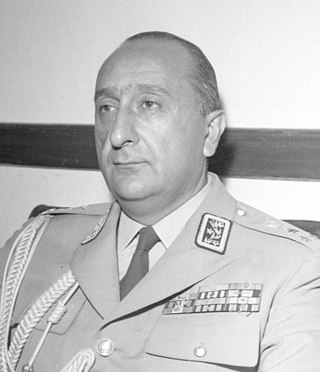
Nematollah Nassiri was an Iranian military officer who served as the director of SAVAK, the Iranian intelligence agency during the rule of Mohammad Reza Shah Pahlavi, and later the Ambassador of Iran to Pakistan. He was one of the 438 individuals who were arrested and executed in 1979 following the Iranian Revolution.
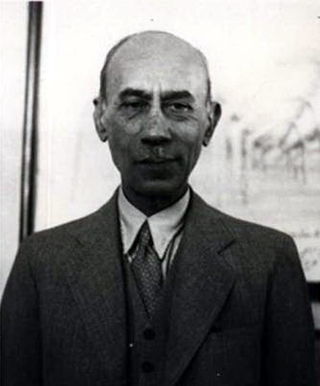
Ali Khan Mansur was the prime minister of Iran for two terms between 1940 and 1941 and in 1950.

Ali Razmara, also known as Haj Ali Razmara, was a military leader and prime minister of Iran.
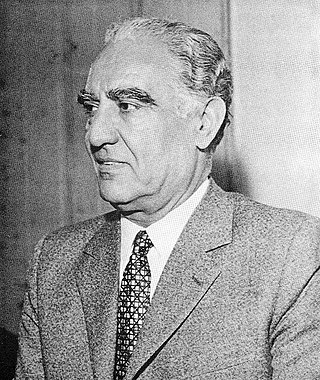
Manouchehr Eghbal was an Iranian physician and royalist politician. He was the Prime Minister of Iran from 1957 to 1960.

Hasan Ali Mansur was an Iranian politician who served as Prime Minister from 1964 to 1965. He served during the White Revolution of the Shah Mohammad Reza Pahlavi and was assassinated by a member of the Fada'iyan-e Islam.
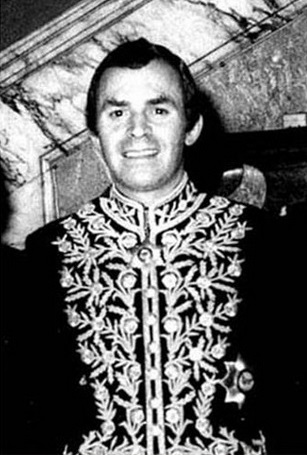
Parviz Camran Radji was an Iranian diplomat and the last ambassador in London, under Shah Mohammad Reza Pahlavi.

Nasser Yeganeh was an Iranian jurist, politician and statesman. He served as Chief Justice of the Supreme Court, the head of the Iranian judiciary, brought in during Amir-Abbas Hoveyda's tenure.
Events from the year 1964 in Iran.

Mehrdad Pahlbod, born as Ezatollah Minbashian, was an Iranian politician who served as the first culture minister of Iran from 1964 until 1978.

Mohammad Bokharaei, was a member of the executive branch of the "Islamic Coalition Party" who was born in 1944 in the south of Tehran. He assassinated Hassan Ali Mansur and was executed in June 1965 along with three of his colleagues.
Mohammad Sadeq Amani was an Iranian political activist. He was a member of both Fada'iyan-e Islam and the Islamic Coalition Party. Amani was involved in the January 1965 assassination of Hassan Ali Mansur, Prime Minister of Iran during the Shah Mohammad Reza Pahlavi administration. He was later executed by the regime for his part in the assassination.
Morteza Niknejad was an Iranian Shia Twelver who was a member of Islamic Coalition Party. Niknejad was born in 1942 in the south of Tehran in a religious family; he too was a religious person since his adolescence. Morteza passed his primary-school, and later commenced working at the market—as a Galesh seller.

Reza Saffar-Harandi was an Iranian Twelver Shia Muslim who was a member of Islamic Coalition Party. He was born in 1946 in a religious family; His brother was Ali-Asqar Harandi who was a Shia cleric. Reza Saffar-Harrandi studied at (Islamic) religious lessons to his brother after passing his primary school. He also used to work in his brother's shop.
Ataollah Khosravani was an Iranian politician. He served as the secretary-general of Iran Novin Party and held several cabinet posts in the 1960s.
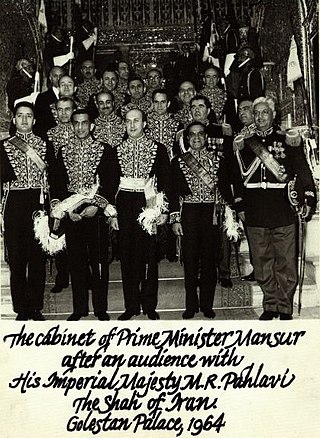
The cabinet led by Prime Minister Hassan Ali Mansur was inaugurated on 7 March 1964. It replaced the second government of Asadollah Alam. Mansur's cabinet was the first of party-governments in Iran. It was led by the Iran Novin Party and was approved by the Majlis on 8 March. It enjoyed nearly full confirmation at the Majlis, including the members of the opposition party, People's Party.

The cabinet led by Prime Minister Amir Abbas Hoveyda was inaugurated on 26 January 1965 to succeed the cabinet of Hassan Ali Mansur due to the assassination of Mansur on 21 January. Like its predecessor the cabinet was led by the Iran Novin Party.
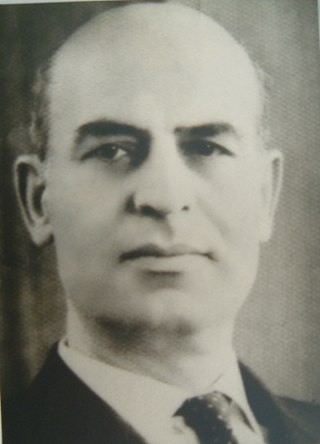
Javad Sadr was an Iranian diplomat and politician who held various public and cabinet posts. He was one of the Iranian ambassadors to Japan. He was the minister of interior and minister of justice in the 1960s.